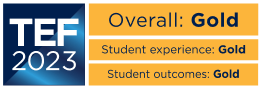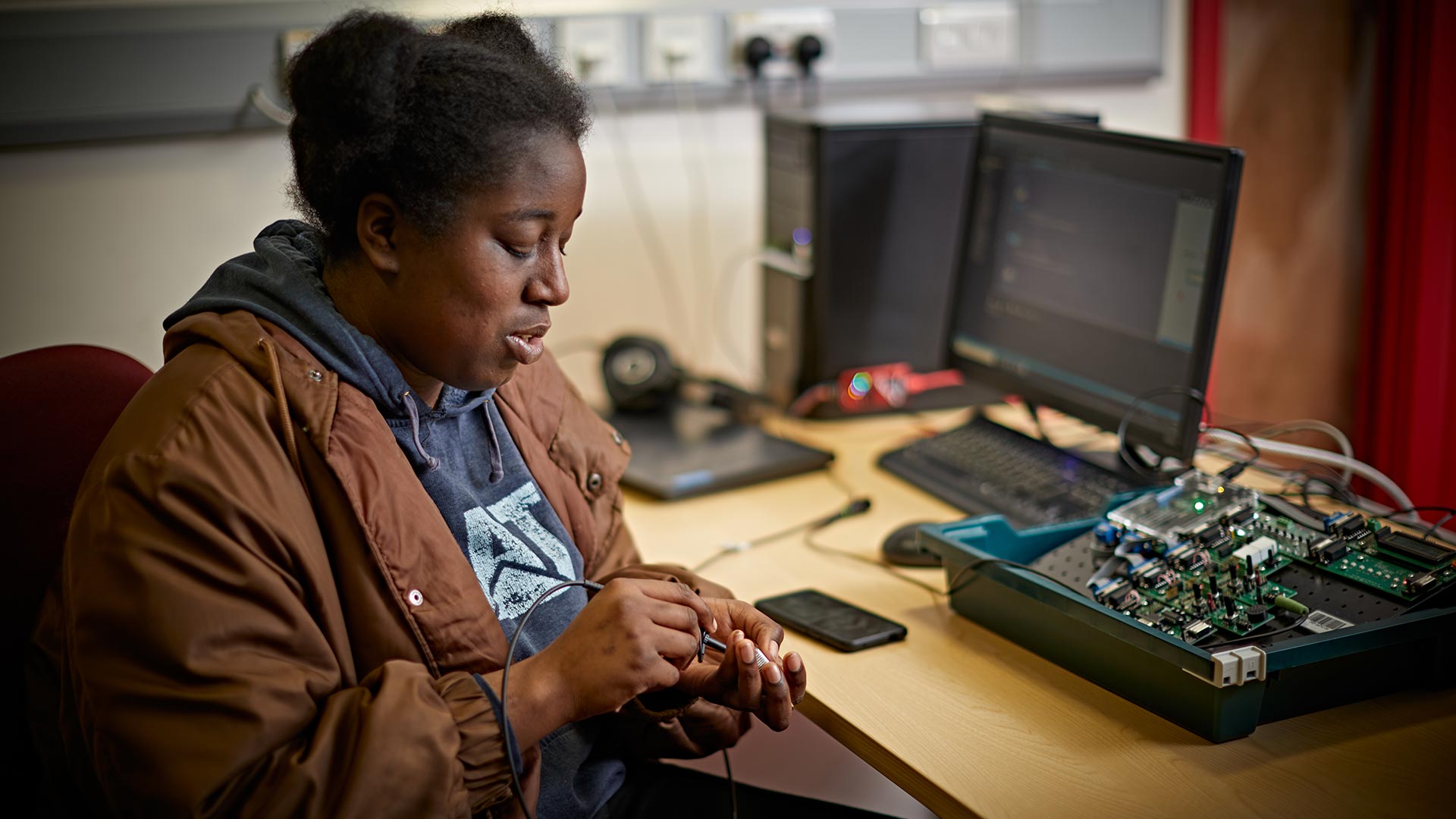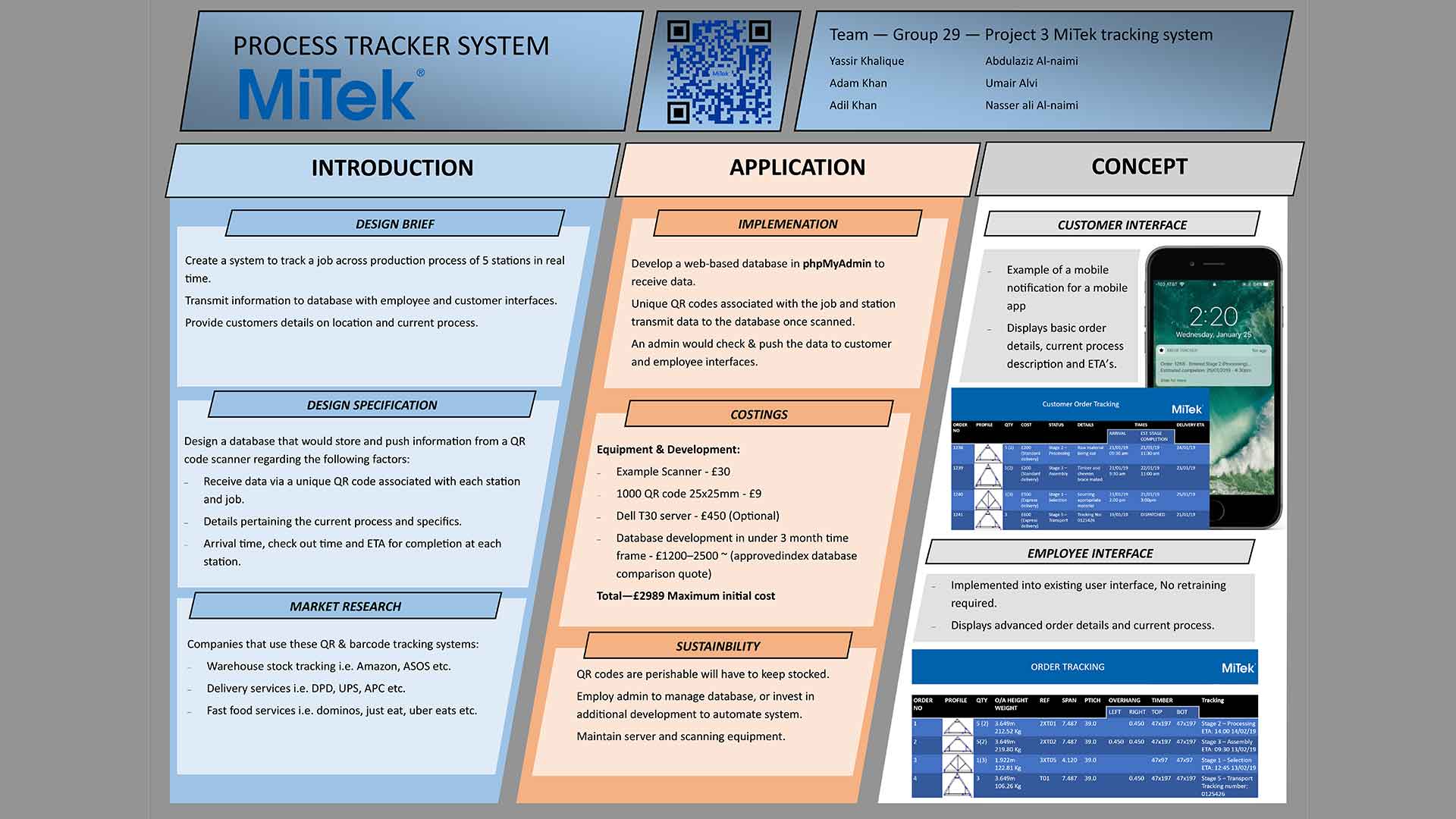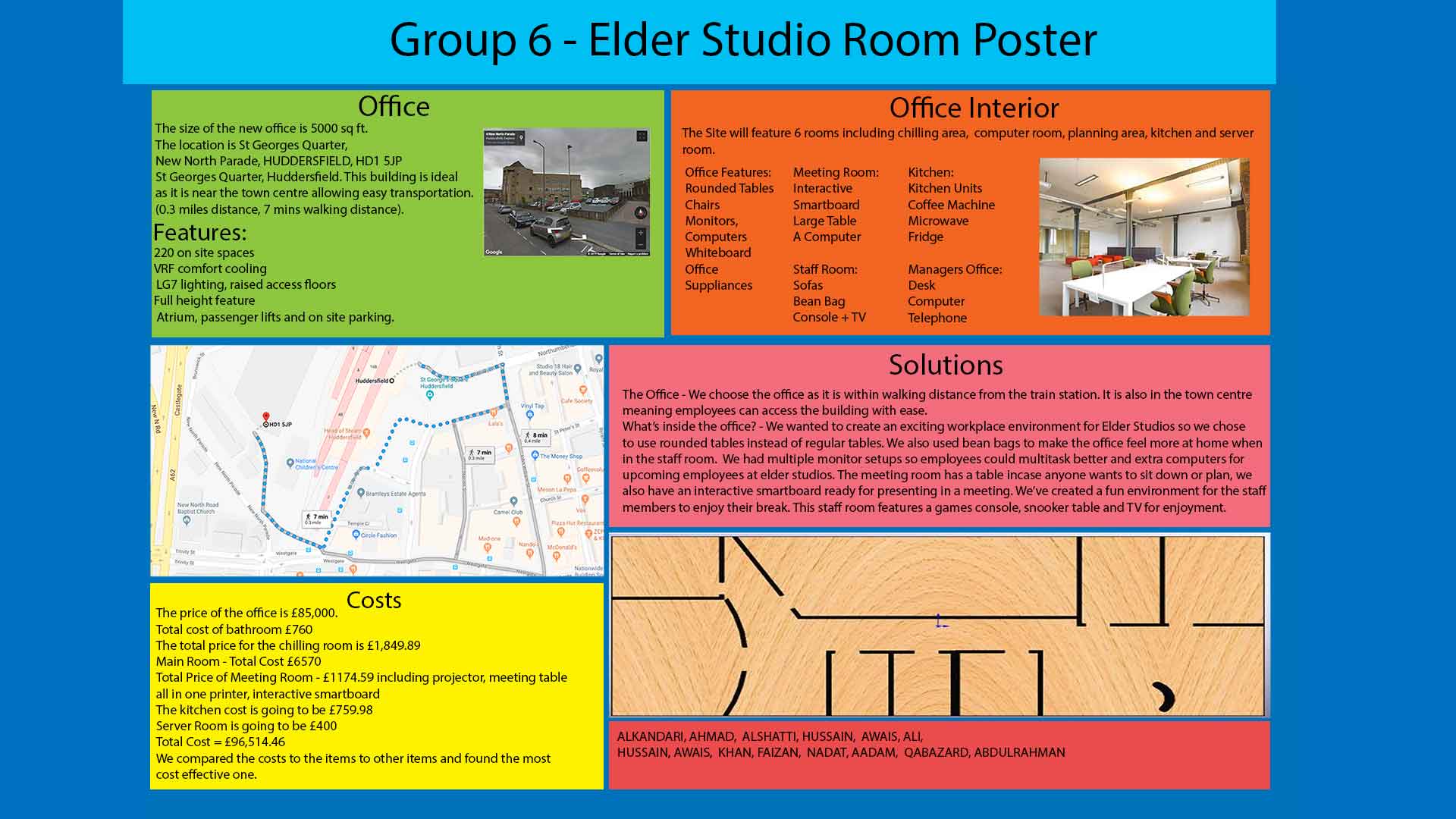Engineering Foundation Year
Start Dates
21 September 2026
Duration
Year 0 of a 4 or 5 year full-time degree
UCAS Tariff
64
Overview
Why choose Huddersfield for this course?
- Prepare for a STEM degree and a career in high-tech industries tackling global challenges such as building a sustainable future.
- You’ll have many options to choose from for your full course after developing skills in a range of key areas on your foundation year.
- Tailored support and a strong academic foundation will help you bridge to your full course with confidence.
Perhaps you're fascinated by engineering but have never formally studied the subject. Or you have an interest in the world of computing or maths and want to take your next steps into an exciting future. You may have decided on a career change. This course could also be ideal route for you if you do not have the usual academic qualifications to study at degree level.
This course has been designed to give you a strong foundational understanding of key areas of mathematics and engineering in preparation for further study on a range of courses within the University. The Foundation Year isn’t a stand-alone course, but provides an introductory level study that leads to the following accredited courses:
- Computing
- Information Technology BSc(Hons)
- Engineering
- Automotive and Motorsport Engineering BEng(Hons), Civil Engineering BEng (Hons) Electronic and Electrical Engineering BEng(Hons), Electronic and Communication Engineering BEng(Hons), Electronic Engineering and Computer Systems BEng(Hons), Mechanical Engineering BEng(Hons), Mechatronic Engineering BEng(Hons),
- Games Development
- Games Development (Production) BSc(Hons)
- Quantity Surveying and Construction Project Management
- Quantity Surveying BSc(Hons), Construction Management Project BSc(Hons)
To progress onto a degree, you must gain an average mark of 40 per cent and have passed each component of your Foundation Year.
This course is year 0 of a 3 or 4 year full-time degree (your degree length is dependant on if you take a placement year). You’ll study the foundations of mathematics and engineering while also building your confidence in the practical application of engineering skills.
Entry Requirements
CC at A Level.
MPP in BTEC Level 3 Extended Diploma.
64 UCAS tariff points from a combination of Level 3 qualifications.
Access to Higher Education Diploma with 45 Level 3 credits at Merit or above.
Pass at T Level with D or E grade on core.
64 UCAS tariff points from International Baccalaureate qualifications.
Other suitable skills or experience will be considered.
In addition you must have GCSE Maths at grade 4 or above, or grade C or above if awarded under the previous GCSE grading scheme.
If your first language is not English, you will need to meet the minimum requirements of an English Language qualification. The minimum for IELTS is 6.0 overall with no element lower than 5.5, or equivalent. Read more about the University’s entry requirements for students outside of the UK on our International Entry Requirements page.
Other suitable experience or qualifications will be considered. For further information please see the University's minimum entry requirements.
Course Details
Teaching and Assessment
Discover what to expect from your tutor contact time, assessment methods, and feedback process.
Your Career
Successful completion of the Foundation Year course allows you to progress onto Year 1 of your chosen degree.
Students from this course have gone on to successes including graduating with an MEng or First Class BEng(Hons) degree. Our previous engineering graduates have been employed by companies such as The D.E shaw group, Schneider Electric, Bentley Motors Ltd and Cummins Inc.
88.1%
Percentage of graduates from the School of Computing and Engineering who are in work or further study 15 months after graduation
* (HESA Graduate Outcomes 21/22, UK Domiciled).
I hugely recommend the foundation year. I gained a good understanding of basic engineering principles and it even gave me an advantage over others in some areas, such as CAD and report writing. I had the opportunity to sample the various disciplines to decide on the right career path. When I finished the year, I went on to complete the Mechanical Engineering BEng(Hons) degree.
- Kris Entwistle
Mechanical Engineering BEng(Hons), Aero
Concept Designer at Scuderia Ferrari
Fees and Finance
This information is for Home students applying to study at the University of Huddersfield in the academic year 2026/27.
Please note that tuition fees for subsequent years may rise in line with inflation (RPI-X) and/or Government policy.
From January 2027 the UK government is launching a new student funding system for people starting university education. Read more about the Lifelong Learning Entitlement (LLE).
For detailed information please visit https://www.hud.ac.uk/study/fees/
This information is for international students applying to study at the University of Huddersfield in the academic year 2026/27.
Please note that tuition fees for subsequent years may rise in line with inflation (RPI-X) and/or Government policy.
For detailed information please visit https://www.hud.ac.uk/international/fees-and-funding/
Optional short field trips e.g. one day, are sometimes also arranged. Previous field trips have included Advanced Engineering Exhibition and Silverstone Museum. The costs of these field trips are heavily subsidised by the school but can sometimes incur a nominal cost and/or deposit of between £5 and £40 depending on the trip.
Depending on the student's choice of project, may incur costs on project materials, but many materials available from the department. (final year and masters only)
Scholarships and Bursaries
Discover what additional help you may be eligible for to support your University studies.
Tuition Fee Loans
Find out more about tuition fee loans available to eligible undergraduate students.
What’s included in your fee?
We want you to understand exactly what your fees will cover and what additional costs you may need to budget for when you decide to become a student with us.
If you have any questions about Fees and Finance, please email the Student Finance Team.
Gallery
Explore More
Why Hud
Explore the unique opportunities and resources that make our institution a top choice for students seeking a well-rounded and future-focused education.
More Info
Careers support
We know you’re coming to university to study on your chosen subject, meet new people and broaden your horizons. However, we also help you to focus on life after you have graduated to ensure that your hard work pays off and you achieve your ambition.
Find out more about careers supportStudent support
At the University of Huddersfield, you’ll find support networks and services to help you get ahead in your studies and social life. Whether you study at undergraduate or postgraduate level, you’ll soon discover that you’re never far away from our dedicated staff and resources to help you to navigate through your personal student journey.
See our support servicesTeaching Excellence
Great teaching is engaging and inspiring — it helps you reach your full potential and prepares you for the future. We don’t just teach well — we excel — and we have the awards and recognition to prove it.
Find out moreInspiring Academics
Our researchers carry out world-leading work that makes a real difference to people’s lives. Staff within the Department of Engineering may teach you on this course.
Find out more about our staffResearch Excellence
You’ll be taught by staff who want to support your learning and share the latest knowledge and research.
Find out moreAccommodation
Looking for student accommodation? Huddersfield has you covered. HudLets has a variety of accommodation types to choose from, no matter what your preference. HudLets is the University’s approved accommodation service, run by Huddersfield Students’ Union.
Take a look at your optionsFurther Study
If you want to continue your learning beyond your undergraduate degree, there is a range of financial support available for postgraduate study, including discounts for Huddersfield graduates.
Discover postgraduate coursesLegal information
When you enrol as a student of the University, your study and time with us will be governed by our terms and conditions, Handbook of Regulations and associated policies. It is important that you familiarise yourself with these as you will be asked to agree to them when you join us as a student. You will find a guide to the key terms here, along with the Student Protection Plan.
Although we always try and ensure we deliver our courses as described, sometimes we may have to make changes for the following reasons:
Changes to a course you have applied for but are not yet enrolled on
If we propose to make a major change to a course that you are holding an offer for, then we will tell you as soon as possible so that you can decide whether to withdraw your application prior to enrolment. We may occasionally have to withdraw a course you have applied for or combine your programme with another programme if we consider this reasonably necessary to ensure a good student experience, for example if there are not enough applicants. Where this is the case we will notify you as soon as reasonably possible and if you are unhappy with the change we will discuss with you other suitable courses we can transfer your application to. If you do not wish to transfer to another course with us, you may cancel your application and we will refund you any deposits or fees you have paid to us.
Changes to your course after you enrol as a student
Changes to option modules
Where your course allows you to choose modules from a range of options, we will review these each year and change them to reflect the expertise of our staff, current trends in research and as a result of student feedback or demand for certain modules. We will always ensure that you have an equivalent range of options to that advertised for the course. We will let you know in good time the options available for you to choose for the following year.
Major changes
We will only make major changes to non-optional modules on a course if it is necessary for us to do so and provided such changes are reasonable. A major change is a change that substantially changes the outcomes, or a significant part of your course, such as the nature of the award or a substantial change to module content, teaching days (part time provision), type of delivery or assessment of the core curriculum. For example, it may be necessary to make a major change to reflect changes in the law or the requirements of the University’s regulators or a commissioning or accrediting body. We may also make changes to improve the course in response to student, examiners’ or other course evaluators’ feedback or to ensure you are being taught current best practice. Major changes may also be necessary because of circumstances outside our reasonable control, such as a key member of staff being unable to teach due to illness, where they have a particular specialism that can’t be adequately covered by other members of staff; or due to pandemics, other disasters (such as fire, flood or war) or changes made by the government.
Major changes would usually be made with effect from the next academic year, but may happen sooner in an emergency. We will notify you as soon as possible should we need to make a major change and will consult with affected groups of students and any changes would only be made in accordance with our regulations. If you reasonably believe that the proposed change will cause you detriment or hardship we will, if appropriate, work with you to try to reduce the adverse effect on you or find an appropriate solution. Where an appropriate solution cannot be found and you let us know before the change takes effect you can cancel your registration and withdraw from the University without liability to the University for any additional tuition fees. We will provide reasonable support to assist you with transferring to another university if you wish to do so and you may be eligible for an exit award depending on how far through your course you are.
In exceptional circumstances, we may, for reasons outside of our control, be forced to discontinue or suspend your course. Where this is the case, a formal exit strategy will be followed in accordance with the student protection plan.
The Office for Students (OfS) is the principal regulator for the University.














